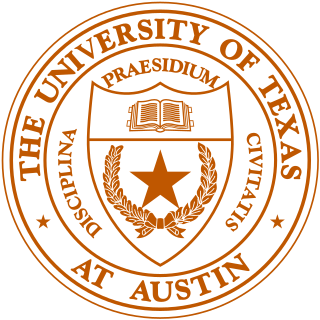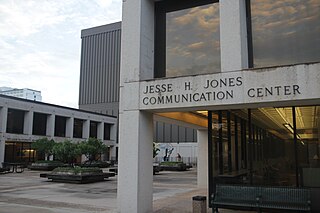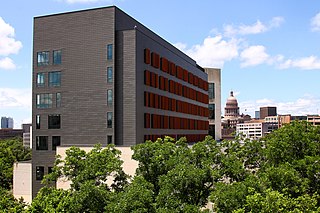Related Research Articles

The University of Texas at Austin is a public research university in Austin, Texas. It is the flagship institution of the University of Texas System. With 52,384 students as of Fall 2022, it is also the largest institution in the system.
The University of Texas Health Science Center at Houston (UTHealth) is a public academic health science center in Houston, Texas, United States. It was created in 1972 by The University of Texas System Board of Regents. It is located in the Texas Medical Center, the largest medical center in the world. It is composed of six schools: McGovern Medical School, The University of Texas MD Anderson Cancer Center UTHealth Graduate School of Biomedical Sciences, UTHealth School of Dentistry, Cizik School of Nursing, UTHealth School of Biomedical Informatics and UTHealth School of Public Health.
The Cockrell School of Engineering is one of the eighteen colleges within the University of Texas at Austin. It has more than 8,000 students enrolled in eleven undergraduate and thirteen graduate programs. Annual research expenditures are over $267 million and the school has the fourth-largest number of faculty in the National Academy of Engineering.

The College of Natural Sciences at The University of Texas at Austin offers 10 Bachelor of Arts majors, 42 Bachelor of Science majors, and 20 graduate programs to more than 11,000 undergraduates and 1,400 graduate students. The college employs over 370 faculty. Many of the programs are consistently ranked in the top ten nationally, according to U.S. News & World Report (2019), including: Analytical Chemistry (4th), Applied Math (9th), Artificial Intelligence (8th), Computer Science (10th), Computing Systems (8th), Computing Theory (7th), Cosmology/Relativity/Gravity (10th), Ecology, Evolution and Behavior (6th), Mathematics Analysis (7th), Plasma Physics (3rd), Programming Language (8th), and Topology (8th). It was established in 1883.
Theresa A. Jones is a researcher and professor at the University of Texas at Austin and the Institute for Neuroscience. Her interests are in neural plasticity across the lifespan, motor skill learning, mechanisms of brain and behavioral adaptation to brain damage, and glial-neuronal interactions. Her research is on the brain changes following stroke, in particular rehabilitation strategies and the brain changes associated with them. She primarily tests rats and uses the Endothelin-1 stroke model. Her most recent work has expanded into the field of microstimulation mapping of the rat cortex.

The Moody College of Communication is the communication college at The University of Texas at Austin. The college is home to top-ranked programs in advertising and public relations, communication studies, communication and leadership, speech, language and hearing sciences, journalism, and radio-television-film. The Moody College is nationally recognized for its faculty members, research and student media. It offers seven undergraduate degrees, including those in Journalism, Advertising, and Radio-Television-Film, and 17 graduate programs. The Moody College of Communication operates out of the Jesse H. Jones Communication Complex and the Dealey Center for New Media, which opened in November 2012.

Nicholas (Nikolaos) A. Peppas is a chemical and biomedical engineer whose leadership in biomaterials science and engineering, drug delivery, bionanotechnology, pharmaceutical sciences, chemical and polymer engineering has provided seminal foundations based on the physics and mathematical theories of nanoscale, macromolecular processes and drug/protein transport and has led to numerous biomedical products or devices.
Bin He is a Chinese American biomedical engineering scientist. He is the Trustee Professor of the Department of Biomedical Engineering, professor by courtesy in the Department of Electrical and Computer Engineering, and Professor of Neuroscience Institute, and was the head of the department of Biomedical Engineering at Carnegie Mellon University. Prior, he was Distinguished McKnight University Professor of Biomedical Engineering and Medtronic-Bakken Endowed Chair for Engineering in Medicine at the University of Minnesota. He previously served as the director of the Institute for Engineering in Medicine and the Center for Neuroengineering at the University of Minnesota. He was the Editor in Chief of the IEEE Transactions on Biomedical Engineering and serves as the editor in chief of IEEE Reviews in Biomedical Engineering. He was the president of the IEEE Engineering in Medicine & Biology Society (EMBS) from 2009 to 2010 and chair of International Academy of Medical and Biological Engineering from 2018 to 2021.
Stanislav (Stas) Emelianov is a former professor of biomedical engineering at University of Texas at Austin. He is also the founder of Ultrasound Imaging and Therapeutics Laboratory. Since August 2015, he moved to Georgia Institute of Technology, where he has been appointed as the Joseph M. Pettit Chair in Microelectronics and as a Georgia Research Alliance Eminent Scholar. He is based in the Georgia Tech School of Electrical and Computer Engineering with a joint appointment in the Wallace H. Coulter Department of Biomedical Engineering at Georgia Tech and Emory University.

The Dell Medical School is the graduate medical school of The University of Texas at Austin in Austin, Texas. The school opened to the inaugural class of 50 students in the summer of 2016 as the newest of 18 colleges and schools on the UT Austin campus. S. Claiborne "Clay" Johnston was named as the medical school's inaugural dean in January 2014. On September 1, 2021, Johnston stepped down from his position and George Macones was named interim dean. Claudia Lucchinetti,M.D. was announced as the new dean and began her term on December 1, 2022.
Rishikesh Narayanan is an Indian neuroscientist, computer engineer and a professor at the Molecular Biophysics Unit (MBU) of the Indian Institute of Science. He is the principal investigator at the Cellular Neurophysiology Laboratory of MBU where his team is engaged in researches on experimental and theoretical aspects of information processing in single neurons and their networks. The Council of Scientific and Industrial Research, the apex agency of the Government of India for scientific research, awarded him the Shanti Swarup Bhatnagar Prize for Science and Technology, one of the highest Indian science awards, in 2016, for his contributions to biological sciences.
Don Fussell is an American computer scientist, currently the Trammell Crow Regents Professor at the University of Texas at Austin, and the chairman of its computer science department.
Molly S. Bray is an American geneticist, currently the Susan T. Jastrow Human Ecology Chair for Excellence in Nutritional Sciences at University of Texas at Austin. Bray is a nationally recognized expert and a featured speaker on the genetics of obesity, energy balance, and exercise response. She is a Professor and chair in the Department of Nutritional Sciences at the University of Texas at Austin, with a master's degree in Exercise Physiology from the University of Houston and a PhD in Human and Molecular Genetics from the UT Graduate School of Biomedical Sciences. She also served as the former Director of the Heflin Center for Genomic Science Genomics Core Laboratory at the University of Alabama at Birmingham and the Children's Nutrition Research Center/Baylor College of Medicine Genetics Core Laboratory. Bray's research focuses on the relationship between energy balance and lifestyle factors such as exercise, nutrition, and circadian patterns of behavior. Her findings related to how the timing and quality of energy intake affect weight gain and metabolic health have been featured on national and international news programs and a myriad of websites and popular news media. Bray also currently leads one of the largest genetic studies of exercise adherence established to date, the Training Interventions and Genetics of Exercise Response (TIGER) study, with a total cohort of more than 3,700 individuals. Bray's research has included investigations of aerobic fitness and resting and exercise energy expenditure in children and adolescents, circadian studies of feeding and metabolic response, and clinical studies of morbidly obese adolescents undergoing bariatric surgery. Bray has published extensively in a wide range of peer-reviewed journals and her work has been featured in national and international scientific meetings.
Zengjian Jeffrey Chen is a plant biologist and molecular geneticist, currently the D. J. Sibley Centennial Professor of Plant Molecular Genetics at University of Texas at Austin. Chen received his B.S. at Zhejiang Agricultural University, M.S. at Nanjing Agricultural University, and Ph.D. in Genetics at Texas A&M University. Following a postdoctoral position at University of Minnesota and as an NIH Postdoctoral Fellow at Washington University in St. Louis, he joined the faculty at Texas A&M in 1999, where he was promoted to the rank of associate professor with tenure. In 2005, he moved to The University of Texas at Austin and became a full professor in 2008 in the Departments of Molecular Biosciences and lntegrative Biology, Center for Computational Biology and Bioinformatics, and Institute for Cellular and Molecular Biology.
Kristen Harris is Professor of Neuroscience and Fellow in the Center for Learning and Memory at the University of Texas at Austin. Her research group at UT Austin uses serial section electron microscopy to study synapses. She is also a member of the Institute for Neuroscience and the Center for Theoretical and Computational Learning.

Daniel I. Bolnick is an American evolutionary biologist. He is a full professor at the University of Connecticut. He was editor-in-chief of the journal The American Naturalist from 1998-2003, and President of The American Society of Naturalists in 2025.
Christine E. Schmidt is an American biomedical engineer. As a professor at the University of Florida, Schmidt was inducted into the Florida Inventors Hall of Fame for her creation of the Avance Nerve Graft which has "improved the lives of numerous patients suffering from peripheral nerve damage."

Robert LeMoine Rennaker II is an American neural engineer. He is a full professor of neuroscience and holds the Texas Instruments distinguished chair in bioengineering University of Texas at Dallas as of January 2015.
The Center for Learning and Memory is a research institute at The University of Texas at Austin with a mission of advancing memory research. The center consists of faculty affiliated with the university's psychology and neuroscience departments as well as neurology and psychology faculty from Dell Medical School.
References
- ↑ "Faculty". utexas.edu. Retrieved December 11, 2016.
- 1 2 3 "Daniel Johnston CV". utexas.edu. 19 September 2010. Retrieved December 11, 2016.
- ↑ "How a World-class Center for Learning and Memory Got Its Start". The University of Texas at Austin Department of Neuroscience. Retrieved 15 May 2024.